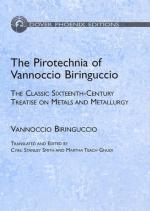|
This section contains 280 words (approx. 1 page at 300 words per page) |
World of Chemistry on Vanuccio Biringuccio
Vanuccio Biringuccio was a sixteenth century pioneer in the field of metallurgy. He deviated from and discounted the centuries-old idea of alchemy and transmutation, that a particular (and as yet undiscovered substance) would transform common metals into silver or gold. Biringuccio's theories and experiments laid the groundwork for what we know today as chemistry.
Biringuccio recorded his knowledge in the famous book, Pirotechnia, published in 1540. This ten-volume set was the first printed work to cover the entire field of contemporary metallurgy and touch on applied chemistry. In it, he addresses a multitude of subjects including the liquidation of silver from copper; the manufacture of steel; the description of semi-minerals such as alum, arsenic, common salt, saltpeter, and manganese; how mercury is obtained; and how to separate and purify sulfur. He distinguishes saltpeter from soda; formulates a method for casting bronze and other metals; and gives several compositions for gunpowder. He also describes a method for manufacturing weapons, discusses military arts, and explains the use of machinery driven by waterpower.
Little is know of Biringuccio's private life. He was born in Siena, Italy in 1480 and died in Rome in 1538 or 1539. In his youth, he worked for Pandolfo Petrucci, known as the Tyrant of Siena, falling in and out of popularity with the ruler. His already comprehensive knowledge of technology and metallurgy expanded greatly following a trip to Germany. Later in his career, he entered the service of the Duke of Parama, Duke Alphonso I of Ferrara, and the republic of Venice. He became known for his adroit military skills, which earned him the role of director of the arsenal for the Pope, the position he held until he died.
|
This section contains 280 words (approx. 1 page at 300 words per page) |


